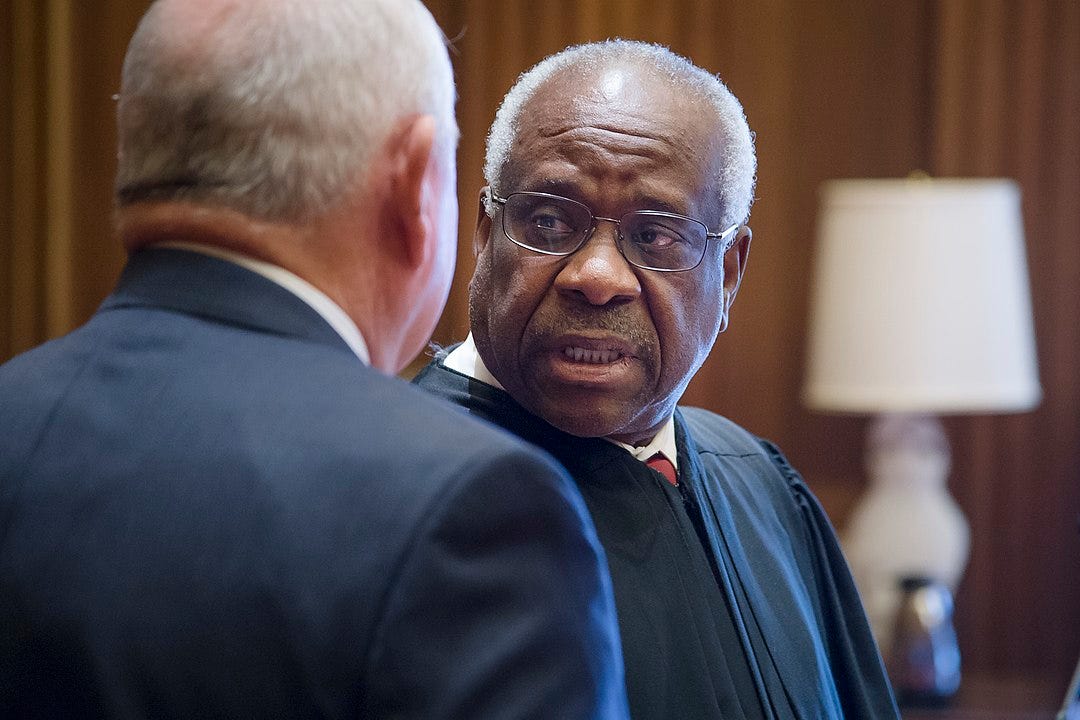Editor’s note: Evidently, Twitter and Substack are at war with one another, so for the time being I cannot embed tweets in my newsletters. My workaround is to screengrab the tweet and place it in the post as art. Then if you click on the image, it will link back to the original tweet and open it in anew window. This is especially useful if the tweets contain videos because it’s the only way you can view them. Thanks for your patience, dear readers.
I don’t want to beat a dead horse over Supreme Court Justice Clarence Thomas, but this follow-up story in Pro Publica cries out for comment. In its second effort this month probing the relationship between Thomas and uber-donor Harlan Crow, the nonprofit investigative media outlet breaks the story that nine years ago one of Crow’s companies purchased three properties the justice and his family owned in Savannah, Georgia, including one housing Thomas’ elderly mother.
Four ethics experts interviewed by Pro Publica said it appears that Thomas violated a disclosure law enacted after the Watergate scandal requiring Supreme Court justices and other officials to disclose the details of most real estate sales over $1,000. This latest development follows revelations earlier this month that Thomas accepted a series of luxury vacations from the same billionaire real estate magnate — and again, failed to disclose the purchases.
As has been noted elsewhere, the Supreme Court of the United States pretty much polices itself, largely because it’s the third branch of government and, as such, should remain free from interference by the executive and legislative branches, as suggested by the constitution’s establishment of three separate but equal branches of government. I don’t know about you, but I trust organizations to investigate their own misconduct about as much as I trust police internal affairs units — which is to say, not a whole lot.
Look at how well the Supreme Court’s staff did in its own investigation into who leaked the draft of the court’s decision that overturned Roe v. Wade last year. That probe came at the behest of Chief Justice John Roberts, who seems disinclined to take similar action on Thomas.
In extreme cases of judicial misconduct, Congress can pursue the impeachment process, which originates in the House Judiciary Committee. The impeachment and removal of federal judges is rare but it does happen, most recently with United States District Court Judge Thomas Porteous, an appointee of President Bill Clinton who stood accused of corruption and perjury charges. Porteous was impeached by the House and was convicted and removed by the Senate in 2010.
The chances of that happening to Thomas are slim to none. The Republicans who control the House would never vote to bring a conservative SCOTUS justice up on charges, in part because the 75-year-old Thomas would be replaced by the nominee of a Democratic president. Besides, Judiciary Committee Chairman Jim Jordan is too busy protecting Donald Trump, parading himself around Manhattan and begging for media coverage of his “field hearing” on victims of violent crime in New York, where DA Alvin Bragg in prosecuting Trump.
And as my journalism colleague and fellow Wesleyan alum Paul Starobin asked on Facebook: “What says the Judicial Conference of the U.S., over which Roberts presides and which is the policy body for federal courts?”
As it did last time, the Wall Street Journal made a halfhearted attempt to defend Thomas. Rather than an unsigned editorial, the defense came in the form of an op-ed from James Taranto, the editorial page features editor.
Taranto’s piece, The Truth About Clarence Thomas’s Disclosures (free link), attacks Pro Publica’s motives and cites a couple of minor reporting errors. He posits that the fact that Thomas has in past disclosed many other transactions is reason to think the justice’s failure this time was merely an oversight.
“But my review of Justice Thomas’s disclosures and other documents convinces me that any failure to disclose was an honest mistake,” Taranto wrote. I wonder if the writer would be so forgiving if George Soros had taken Sonia Sotomayor on lavish vacations to exotics places like Indonesia and New Zealand and purchased three of her family’s properties without the justice uttering a peep about it.
I think we all know the answer to that question.






Roberts- sorry. The autocorrect got ahead of me!
Garland could go after Thomas, but I suspect they move in the same circles, so he won’t. Robert’s will do nothing, and Thomas does not have the dignity to resign. So we are left with what is surely becoming a less than a trustworthy SCOTUS. Imagine this happening in America!